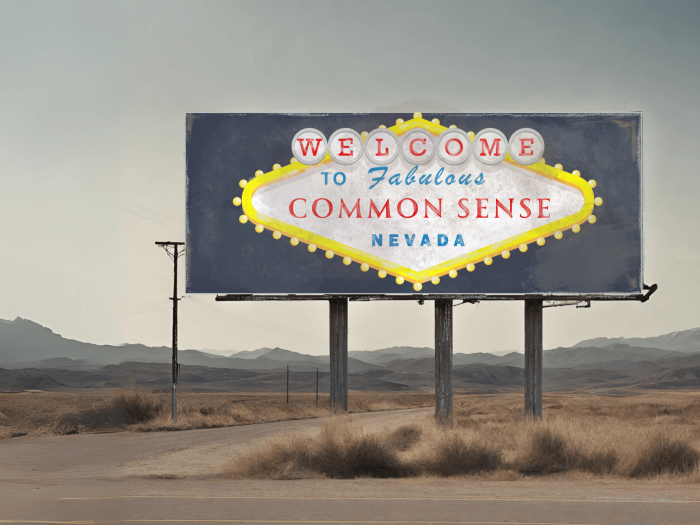Common sense, once considered the bedrock of rational decision-making, has become a rare commodity in modern times. In an era where misinformation grows and polarization dominates, it’s essential to understand the evolving nature of common sense.
The Changing Face of Common Sense
We rely on common sense because we believe it is a practical and acceptable method of decision-making based on our collective human experiences and everyday reasoning.
What was once regarded as straightforward and logical evolves as society’s understanding and knowledge expand. Today, our notion of common sense is not confined to the wisdom of the past. It also incorporates recent scientific and social advancements.
The Evolution of Common Sense with Knowledge
Common sense is not static; it evolves alongside our collective knowledge.
For example, consider the issue of global warming. In the past, it was common sense to burn fossil fuels for energy, as it was practical and affordable. However, scientific knowledge has recently confirmed its negative effects on the environment. It is now common sense to support cleaner and more sustainable energy sources.
Past concepts of common sense include many examples that we would consider completely ridiculous today.
In medieval times, people generally believed that all heavenly bodies, including the sun and the stars, revolved around the Earth. We saw the heavens move and presumed that we were the center of the universe. People believed this earth-centric view of the cosmos was common sense until Nicolaus Copernicus and later Galileo challenged this belief with the heliocentric model.
Smoking was once viewed as a harmless pastime and even endorsed by doctors. Medical research has clearly demonstrated its harmful effects. It has become common sense to avoid smoking for the sake of one’s health.
In the past, women were regarded as the weaker sex. We believed it was common sense that particular roles and professions were exclusively reserved for men or women.
Different and evolving views make up each person’s supply of common sense. And yet, we still cling to it as an almost infallible method of deciding. In a fast-paced world, it is an efficient and accessible way of choosing paths, based on experience and intuition. But it is far from perfect. It is heavily influenced by things like our past experiences, cultural background, education, peer group and information sources.
The Political Landscape and Challenges
When I think of common sense my mind goes to politics. Currently, politics is an area of enormous instability at a time when we really need unity and steadiness.
The political arena is where we choose the representatives, who will be there to work for us. We hire them to serve as managers of our towns and cities, our provinces or states, and our countries.
These days though, politics is becoming the choice career of the largely self-serving. Predatory social media algorithms manipulate voters. Campaigns on various networks rely on catchy influencer-style content. They prioritize it over clear political plans that inform voters about a politician’s intentions if elected.
Why Common Sense Is Not So Common Anymore
The rise of social media has had a huge impact on the need for real common sense. The sheer deluge of information and disinformation has made it difficult for individuals to discern fact from fiction.
Furthermore, deliberate polarization has fragmented the political landscape, making it hard to find common ground. What one group considers common sense, another group may intensely reject. The erosion of common ground and shared experiences is a significant reason for the loss of common sense.
Politicians and the Endorsement of Common Sense
Politicians often resort to endorsing “common sense” as a rhetorical strategy. Rhetoric means:
- The art of using language, especially public speaking, as a means to persuade.
- Meaningless language with an exaggerated style intended to impress.
We have grown to expect that political discourse will provide some entertainment. As a result, we tend to discount a percentage of rhetoric as necessary to “whip up the masses”. Politicians often rely on platitudes when they lack a comprehensive platform or want to connect with the general, less informed public. Common sense carries an air of simplicity and relatability. It is a way for politicians to seem in touch with the concerns of the common people. However, this approach can oversimplify complex issues to the point where they are unclear or even mask the absence of a concrete policy agenda.
When it comes to spreading the word, politicians often distill common sense messaging into catchy sound bites that people can easily remember and share. Snappy phrases like “powerful paycheques” and “costly coalition” stick – even though what they imply is not defined. What exactly are powerful paycheques? How costly is a particular coalition? Compared to what? These cliches help politicians gain media attention and make their message go viral.
It’s important to note that while common sense rhetoric can be effective in the short term, it does not absolutely lead to effective governance. Nor does it provide useful solutions to complex problems. Voters need to ask questions and examine a politician’s specific policy proposals and track record to assess the substance behind the common sense branding. Otherwise, it’s just hot air.
Conclusion
I don’t vote for someone because they tell me it’s “common sense” to do so. I use my common sense and I vote for a candidate when they can prove to me that they have a carefully-planned strategy that will benefit us all.
How do you like them apples?

